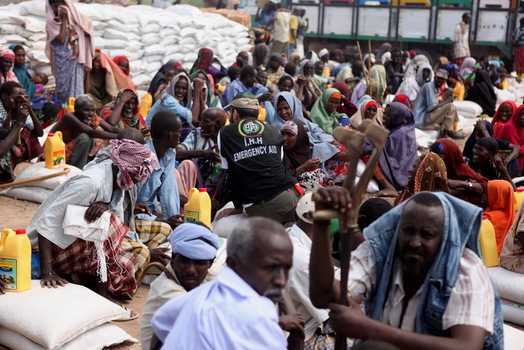
Somali people continue to head for borders to escape starvation and water shortages that are caused by ongoing drought. The Somalis who make it to Dadaab camp in Kenya after walking hundreds of miles live on aid distributions of aid agencies. A member of the IHH Humanitarian Relief Foundation team delivering daily relief supplies at the camp noted they were still people coming to the camp from interior regions and stressed that aid shipments should continue.
The number of Somalis seeking help in Dadaab camp to escape famine in Somalia is rising, the IHH Emergency Aid Coordinator Recep Güzel said. “People continue to move to border areas. They are fleeing famine. Although statements put the number of refugees at Dadaab at 500,000 people, the real number is said to be at least 700,000. Because each day thousands more are arriving here.”
Güzel added “People in the camp are in dire need of assistance. It is true that the epicenter of the famine is Somalia, but an equally big humanitarian crisis is unfolding here. People fleeing Somalia are arriving here. We reach out to 15,000 people daily and give them enough foodstuffs to suffice for between 20 and 25 days. Moreover, we are cooperating with the Association of International Doctors such as providing infrastructure for setting up health clinics.”
We are carrying out relief works considering requests and needs of the Somali people in the camp, Güzel stated and added Somalis wanted to continue their education despite drought and famine. “We are providing opportunities to help Somali children continue their education. We have a project called Duksi. With this project Somali children will be able to resume their training in Quranic instruction at the camp. We have offered 20 trainings so far.”
As the IHH is continuing works to realize permanent projects in the region, it is also offering iftar meals to 3000 people every day in Ramadan in 10 different locations. Meanwhile, the IHH has also started sacrificial slaughters of 1060 head of small cattle donated to the foundation.
IHH VOLUNTEERED TO DISTRIBUTE UN SUPPLIES
The aid workers of the IHH, one of the most influential aid agencies at Dadaab, met with local UN officials. The IHH teams told the UN officials they could voluntarily distribute relief supplies at UN storage facilities.
IHH coordinator Güzel highlighted the significance of flow of aid and concluded as “We are reaching out to around 15,000 persons in a day. We are also assisting other civil society organizations. We explain our projects and help them with aid distributions. More global aid agencies need to come here and offer systematic aid. We feel the absence of aid agencies, because we are having difficulties reaching all the people that are in need of help here. People are too enfeebled to consume food we provide. The need for aid efforts is in place. Aid should continue to flow.”